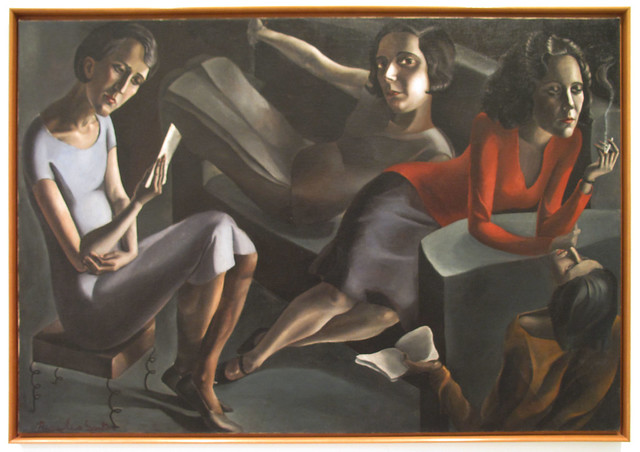Wir möchten die Semesterferien nutzen, um die Zeit zwischen dem ersten Teil der Lesegruppe und dem zweiten Teil im Sommersemester zu überbrücken und auf die Frage eingehen: “Was ist Platypus? Was ist die ‘Linke’?”
Hier werden wir die Gelegenheit haben, den Inhalt der Lesegruppe mit der Frage nach den gegenwärtigen Problemen von linker Politik und dem Selbstverständnis von Platypus einzugehen.
Dafür werden wir uns an drei Terminen im Cafe Crumble Studierendenhaus (K2) (neben dem Kaffe KOZ) in Bockenheim treffen und folgende Texte besprechen:
• vorausgesetzt / + empfohlen
Erstes Treffen: Mittwoch 13. März 2013 (15 Uhr)
- Platypus: Eine kurze Geschichte der Linken /Short history of the Left (2006).
- Leonard, Khan, Rubin, Cutrone: The decline of the Left in the 20th century (2009).
- Morrison: Introducing Platypus (from The Platypus Synthesis, 2009).
+ Was ist ein Schnabeltier? (2006)
+ Mission / Selbstverständnis (2007)
Zweites Treffen: Donnerstag, 28. März (15 Uhr)
- Adorno: Resignation (1969).
- Cutrone: Vicissitudes of historical consciousness and possibilities for emancipatory social politics today (2007).
- Cutrone: History, theory(2009).
+ Audio: The Platypus Synthesis: History, Theory, and Practice (6/14/09)
Drittes Treffen: Donnerstag 11. April (15 Uhr)
- Panel: The 3 Rs: Reform, Revolution, and “Resistance” (Chicago, 2007).
- Panel: Reform, Revolution, Widerstand (Frankfurt, 2012) (vorläufiger Link).
Tags: Frankfurt, Lesekreis, Marxismus, Platypus
Podiumsdiskussion mit
Stephan Lindner (attac)
Margit Rodrian-Pfennig (Uni Frankfurt)
David Salomon (Uni Siegen)
Beschreibung: Von der Finanzkrise und den Bankenrettungsschirmen zur Staatsverschuldungskrise; vom „arabischen Frühling” zu Occupy Wall Street; vom Kampf um eine progressive Europa-Politik zu den Wahlen in Griechenland und Ägypten, die doch so viel versprachen und so wenig veränderten – überall verspürt man die Notwendigkeit, über reinen „Protest“ hinauszugehen. Die Frage nach einer politischen Revolution drängt sich wieder auf. Gleichzeitig scheint das Volk – der Demos – in Anbetracht seiner politischen Machtlosigkeit resigniert zu haben, auch wenn es zur selben Zeit gegen die Korruption der Politik aufbegehrt. Während also gegenwärtig Rufe nach einer Demokratisierung des Demos laut werden, könnte dies jedoch lediglich ein Zeichen sozialer und politischer Regression sein. Dieses Problem gilt es zu erkennen und zu reflektieren.
Forderungen nach einer Demokratie „von unten“ verhallen oft im Nichts oder werden „von oben“ herab getätigt. Weder behielten die sogenannten 99% einen organisierten Charakter, noch drückten sie sich auf eine kohärente Weise in vergangenen Wahlen aus. Statt dessen teilten sie sich, wie so oft, in vielerlei Splittergruppen auf, manche davon durchaus reaktionären Typs. Demokratie verbleibt darum ein schleierhaftes Konzept: Sie nimmt nie eine ganzheitliche Form ein. Und die Menschen im Kapitalismus rufen dann abwechselnd nach „mehr“ und nach „echter“ Demokratie. Doch die Demokratie kann sein wie Janus: Mal mag sie sich durch progressive und emanzipatorische Forderungen auszeichnen – um am Ende besiegt zu werden mit der Wahl des nächsten „Bonaparte“.
Woher rührt der Ruf nach mehr Demokratie in unserer Gegenwart? Wie sieht der Einsatz der Linken für die Ermächtigung der Massen aus? Wie sieht die Zukunft „demokratischer“ Revolutionen aus, besonders im Verständnis der gegenwärtigen Linken?
In Kooperation mit dem AStA der Goethe Uni.
In Kooperation mit dem AStA der Goethe Uni.
Die Podiumsdiskussion fand statt am 06.12.2012
Donnerstag, 06. Dezember, 2012 19 Uhr - Campus Westend / IG NG 1.741b (Nebengebäude)
Podiumsdiskussion mit
Stephan Lindner (attac)
Margit Rodrian-Pfennig (Uni Frankfurt)
David Salomon (Uni Siegen)
Beschreibung:
Von der Finanzkrise und den Bankenrettungsschirmen zur Staatsverschuldungskrise; vom „arabischen Frühling” zu Occupy Wall Street; vom Kampf um eine progressive Europa-Politik zu den Wahlen in Griechenland und Ägypten, die doch so viel versprachen und so wenig veränderten – überall verspürt man die Notwendigkeit, über reinen „Protest“ hinauszugehen. Die Frage nach einer politischen Revolution drängt sich wieder auf. Gleichzeitig scheint das Volk – der Demos – in Anbetracht seiner politischen Machtlosigkeit resigniert zu haben, auch wenn es zur selben Zeit gegen die Korruption der Politik aufbegehrt. Während also gegenwärtig Rufe nach einer Demokratisierung des Demos laut werden, könnte dies jedoch lediglich ein Zeichen sozialer und politischer Regression sein. Dieses Problem gilt es zu erkennen und zu reflektieren.
Forderungen nach einer Demokratie „von unten“ verhallen oft im Nichts oder werden „von oben“ herab getätigt. Weder behielten die sogenannten 99% einen organisierten Charakter, noch drückten sie sich auf eine kohärente Weise in vergangenen Wahlen aus. Statt dessen teilten sie sich, wie so oft, in vielerlei Splittergruppen auf, manche davon durchaus reaktionären Typs. Demokratie verbleibt darum ein schleierhaftes Konzept: Sie nimmt nie eine ganzheitliche Form ein. Und die Menschen im Kapitalismus rufen dann abwechselnd nach „mehr“ und nach „echter“ Demokratie. Doch die Demokratie kann sein wie Janus: Mal mag sie sich durch progressive und emanzipatorische Forderungen auszeichnen – um am Ende besiegt zu werden mit der Wahl des nächsten „Bonaparte“.
Woher rührt der Ruf nach mehr Demokratie in unserer Gegenwart? Wie sieht der Einsatz der Linken für die Ermächtigung der Massen aus? Wie sieht die Zukunft „demokratischer“ Revolutionen aus, besonders im Verständnis der gegenwärtigen Linken?
In Kooperation mit dem AStA der Goethe Uni.
In October, the Platypus Review published it's fiftieth issue. In celebration of this landmark occasion, at the issue No. 50 release party held in New York City on November 15, 2012, an international video conference with the members of the current and past editorial staff of the Platypus Review was held, including speakers involved with the Platypus Review from New York City and Chicago, USA, London, UK, Thessaloniki, Greece, Maastricht, the Netherlands, Frankfurt, Germany, and Graz, Austria.

Auch dieses Semseter finden die Coffee Breaks immer Mittwochs um 16 Uhr im Cafe KOZ statt.
Platypus Coffee Breaks bieten eine hervorragende Gelegenheit Freunde, Unterstützer und Mitglieder von Platypus zu treffen. In einer offenen und geselligen Atmosphäre wollen wir uns über neuere Artikel der Platypus Review (PR) austauschen, der Geschichte und momentanen Lage der internationalen Linken auf den Grund gehen, die Arbeit der Gruppe in den USA, Canada und Großbritannien thematisieren oder einfach nur nett miteinander plaudern.
Dieses Semester: Jeden Mittwoch, 16 Uhr im Cafe KOZ.
Erdgeschoss des Studierendenhauses – Campus Bockenheim.


